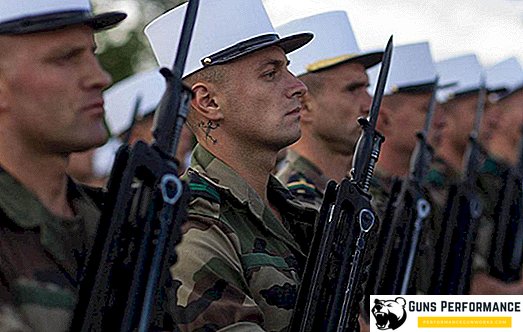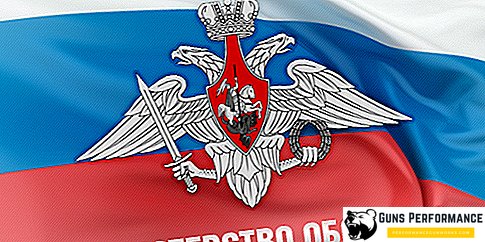
There were less than sixty of them who opposed the whole army.
Her weight crushed them.
Life, rather than courage, left these French soldiers on April 30, 1863.
The inscription on the monument to the legionnaires who fell during Veracruz
Are you tired of a measured and monotonous life? Did you get creditors or are you having problems with the law? Or maybe you just do not have enough adrenaline or are you dreaming of starting everything from scratch? Do not worry, there is a solution. Just take a plane ticket and travel to: France, Paris, 94120 Fontenay-Sous-Bois, Fort De Nogent. Here is one of the recruiting stations of the famous Foreign Legion, and then you will definitely help in all of the above cases. Of course, if you approach them. Knowing French is not necessary, the legion will quickly teach you how to speak correctly.
French Foreign Legion. Legionnaires in white caps, marching across the endless Algerian desert. It is a true symbol of military romance, one might say, its standard, worthy of its place in the Chamber of Measures and Scales. Hot fights, exotic countries, soldierly brotherhood, "go ahead or die" ...
Is it really? What is the French Foreign Legion in reality? After all, there are other rumors about this division. Legionnaires are often called mercenaries who went to military service, just to not be in prison. So what is the Foreign Legion of France, a gathering of bandits and thugs or an elite military unit capable of executing any order?

These questions are doubly interesting, since in recent decades the Foreign Legion has increasingly become the place of service (or refuge) of our compatriots. Several years ago, the official site of the Legion even received a Russian-language version, the third in a row, after the traditional French and English. According to some experts, in the Legion today, up to 30% of the personnel come from the former Soviet republics and countries of Eastern Europe.
Who only of our compatriots did not bring to the service under the red-green banner of Légion étrangère. Among the most famous Russian legionnaires is the elder brother of the Bolshevik Sverdlov and the godson of Maxim Gorky, Zinovy Peshkov, who rose to the rank of general in the French army. Soviet commander and defense minister Rodion Malinovsky, ataman of the Far Eastern Ukrainian army Boris Khreshchatytsky, poet Nikolay Turoverov. In the famous Russian cemetery of Sainte-Genevieve-de-Bois, there is a significant area in which soldiers of the Foreign Legion are buried. In total, since the foundation of the legion, more than 600 thousand people have passed through it, of which about 36 thousand laid down their heads to the glory of France ...

What is the Foreign Legion. Its size and structure
Legionnaire, you are a volunteer who serves France with honor and loyalty.
From Legionnaire's Code of Honor
The Foreign Legion is a military unit that is part of the land forces of France and is staffed primarily by citizens of foreign countries. The legion is forbidden to use on the territory of the metropolis - this is another feature of this unit. In 2009, the number of the legion was about 7.5 thousand soldiers, although in some periods of its history it was much more. For example, at the beginning of the First World War, more than 42 thousand soldiers and officers were members of the Légion étrangère.
Not only foreigners serve in the legion, but also the French, who after joining the unit received not only new personalities, but also the citizenship of another country (Canada, Belgium, Monaco). As a rule, such people have serious problems with the law.
Legionnaires are often called mercenaries, but this is fundamentally wrong. The French Foreign Legion is a structural unit of this country's armed forces, albeit a rather specific one. And he reports directly to the supreme commander in chief - once it was the king, and today the president of the Republic. So the legionaries have no relation to the “wild geese” and have never had ...

The Legion consists of seven tank, infantry, airborne and sapper regiments, as well as one semi-brigade and a separate parachute company. The most famous unit of the Legion, without a doubt, is the 2nd Parachute Regiment, which brilliantly showed itself in Southeast Asia and Africa. Currently, the locations of the Legion’s units are as follows:
- France;
- Mayotte Island (Comoros);
- Mururoa Atoll in the Pacific;
- UAE (Persian Gulf);
- Kourou in French Guiana;
- Corsica.
It is curious that the 1st Armored Cavalry Regiment was created on the basis of cavalrymen of the white army of Wrangel, who fled from the Crimea. The division was founded in 1921. Initially, of the 156 soldiers of this regiment, 128 were Russians. And in this group there were 30 officers, including one colonel and a general. Later, already during World War II, this regiment was the first of all French forces to break into Germany.

The most famous element of legionary equipment is the famous white kepi (Képi blanc). This headgear is only an ordinary composition. The berets of the Foreign Legion are green, on their right side there is a unit symbol - an icon depicting a stylized grenade with seven flames. Kepi can be worn with full dress and everyday wear. He takes on a dress only with a daily uniform, one can not respond to the legionary’s military greeting in full uniform and with a beret on his head.
The flag of the legion is a panel divided diagonally into two halves, red and green. At its center is the sign Légion étrangère.
History of the Foreign Legion: 180 years in the service of France
The Legion survived three republics, two world wars, the decline of the French colonial empire and, finally, the loss of their homeland, which for more than 130 years was for him Algeria ...
It all began with the decree of King Louis-Philippe, issued March 9, 1831. At that time, the situation in the French state was, to put it mildly, alarming. A huge amount of very restless people — former soldiers of the Napoleonic army, revolutionary emigrants from Poland and Italy, and simply rogues of unknown origin — roamed the roads of the country and threatened the very flimsy power of the new king. Most of these people skillfully handled weapons, which made them even more dangerous. They were knocked down in a gang, wandered where necessary and seriously pestering respectable citizens.
At the same time, French expansion unfolded in North Africa. Therefore, the authorities came up with a brilliant idea, which allows them to kill two birds with one stone: collect these former combatants and send them to fight outside the metropolis. Thus, the French army received significant reinforcement in the form of professional soldiers with real combat experience, and the country was rid of a huge number of "unwanted elements" who still had no place in peaceful life. Well, it is clear that such recruits could be used with a clear conscience as a "cannon fodder", because they were not sorry for the word "absolutely."

The decree separately stated that new troops could only be used outside of France.
The royal initiative was, as they say, with a bang. A huge number of yesterday's wanderers and gangsters, attracted by the possibility of free feeding, a roof over their heads and the prospect of obtaining citizenship, began to besiege the recruiters. The new division had one more merit: the recruits were not asked about their past, even the names of the future soldiers were not too interested for employers. It could not be better suited to people who have trouble with the law. Perhaps the stories about legionnaires who fled to the military service literally "from under" the guillotines are exaggeration, but the fact that there were enough murderers and rapists in the early legion is a fact.
The newly formed unit was sent to Africa and there, to the surprise of many, it showed itself very well. The newly minted legionaries were distinguished by complete frostbite in battle and a fierce attitude toward the locals, which, however, is not surprising given the staff.
Since then, gone-gone. The foreign legion participated in most of the colonial squabbles that France led during the 19th and the first half of the 20th century. Legionnaires shed their blood on all continents, except perhaps Australia and Antarctica. They also participated in the suppression of the famous Paris Commune, thereby violating the decree of Louis-Philippe. Then there was the Crimean War, the battle of Alma and the siege of Sevastopol.

The Legion fought in all the significant battles of the First World War, he was thrown into the hell: Verdun, Somme, Gallipoli. The losses among the legionnaires were enormous, but even more was the flow of volunteers who wanted to join the ranks of the unit.
During the Second World War, due to the rapid capitulation of France, the legion was divided between the opposing sides. Part of his fighters fought on the side of De Gaulle’s “Free France”, the other joined the Allied forces, many legionnaires remained in France and supported the Vichy regime. After the end of the war, all the surviving legionaries, no matter who they were for, were again accepted into the unit. For politicians come and go, but the legion remains.
One of the most common "tales" of the Foreign Legion is the dominance of SS veterans in its ranks after the end of the war. This myth is especially loved in the Soviet Union. In fact, the leadership of the Legion made a lot of effort to prevent former SS men from entering its ranks. In addition to the usual checks, practiced a thorough inspection of the body of recruits for characteristic for the SS troops tattoos. Although, it should be noted that in the postwar years there were indeed many Germans from Alsace in the unit.
Of the post-war conflicts in which the legion took part, one can especially distinguish the wars in Indochina and Algeria. The colonial system collapsed, and even the heroism of the legionaries could not save France from defeat in both campaigns. She had to leave both Vietnam and Africa.
If we talk about modern times, the first serious conflict in which the Foreign Legion participated was the first Gulf War. The unit was part of the main French forces and showed its best side. Legionnaires with vast experience of fighting in the desert acted brilliantly, suffering minimal casualties during the campaign.

Then there were the Balkan wars and the war in Afghanistan, where the legion was located until 2012, and the war in Mali, which continues in its sluggish phase today. Today, legionaries perform not only combat work, but also participate in various humanitarian missions. Since its founding, the legion has participated in more than thirty major conflicts only.
Who is taken to the Foreign Legion
This army was called strangely - the Foreign Legion. It seemed that the soldiers and officers of this legion were men who loved war more than their own lives.
George Lozev
The French Foreign Legion is a real "state in a state", an isolated "guild" structure, living by its own rules. Today, of course, this is manifested to a lesser extent than a few decades ago, but still the Legion is an extremely closed organization, with its barracks, training centers, prisons, and even resorts. How to get to the French Foreign Legion? It's very simple - you just need to come to one of his recruiting points. No summons to you, military commissars and attempts to retreat from the service, everything is done solely on a voluntary basis. The admission to the unit itself will be described below, now a few words about who has a chance to get into the service in the legion, and who doesn’t shine a white cap at all.
Legion is absolutely not important race and nationality recruit. Once a citizen of Mongolia rode half the world on a bicycle to get to the legion’s recruiting station in France. The division has many immigrants from Africa, Eastern Europe, Latin America, the United States and the United Kingdom. It does not matter and religion fighters. At the same time, the principle of general leveling works: a Hindu will have to eat beef, and a Jew or a Muslim will have pork. No halal dry packs are provided.

Neither the level of education, nor social status, nor the experience of military service has any effect on the chances of getting into the legion. True, there are some specialties that give the applicant certain bonuses if at the time of admission the legion experiences a need for them. As mentioned above, knowledge of French is also optional. If you like the legion, he will quickly learn to speak you.
And of course, you must be a man. Women in the Légion étrangère are not accepted at all - "Jane's soldiers" are not needed here. In the entire history of the unit, one English girl, Susan Travers, served in it, but this is rather the exception, only the confirming rule.
Now, about who exactly will not take in the Foreign Legion:
- men under 17 and over 39.5 years;
- criminals who are interested in Interpol;
- people who are overweight or underweight;
- those who suffer from serious diseases: cancer, AIDS, hepatitis, diabetes;
- addicts;
- persons with severe mental illness;
- disabled people.
There are other taboos. The legion is tight with tolerance and common European values, therefore, homosexuals here, to put it mildly, are not welcome. This rule is not particularly advertised, but everyone knows about it. In 2018, there was information about the appearance of former legionnaires in the ranks of ISIS (prohibited in the Russian Federation), which, of course, did not make the division’s management happy. So now all immigrants from the Muslim East are checked very carefully. There is information about a complete ban on the admission to the ranks of the legion of followers of the Prophet Mohammed.
Probably the most common misconception regarding the Legion is the presence in its rows of a large number of inveterate criminals. On the one hand, this is true - in the division there are enough bad guys who have disagreements with the law. However, the time when the Légion étrangère took anyone was long gone. If you are a drug dealer, a murderer, a pedophile or a rapist, then the path to the legion is ordered for you. Recruits are carefully checked on the bases of Interpol and not only. So if in your past you find serious "shoals", then, most likely, from the recruiting station you will go straight to the nearest police station. On the other hand, if your problems with the law are limited to petty fraud or someone's broken head, then the legion will close their eyes to them.
How to get to the Foreign Legion
Any legionary, any citizenship, race, creed there
your brother in arms All the time you show him that solidarity
which should unite all members of one family.
From Legionnaire's Code of Honor
Have you decided to serve in the Foreign Legion? Think again. Are you ready to give up your former life, career, family for incomprehensible and rather vague prospects? After all, after serving five years in the Legion and acquiring French citizenship, you are unlikely to return to your homeland. And maybe even worse: they will bring you from some God-forgotten hole in a box under the French tricolor. After all, the legionaries are always on the "front end", they are entrusted with the most dangerous tasks, otherwise they simply do not fight.
If you are still strong in your intentions, then you need to get to any recruiting station, of which there are many in France. From there, the applicant will be sent to one of two qualifying centers, which are located in Aubagne and Paris. Here, those who wish to get into the legion pass tests and interviews, during which it is determined whether this or that person is suitable for service in a unit or not. By the way, do not be fooled by promises to “help” to get into the legion, even the French president is powerless in this matter.

In addition to the usual interview, you will be offered to undergo tests for physical training and level of intelligence, you also expect a conversation with a psychologist. One of the most important stages of selection is the physical, which eliminates a huge number of applicants. Причем причиной может быть даже незначительный сколиоз, о котором сам рекрут может даже и не догадываться.
Очень сложным является собеседование с представителем французской разведки, которое, как правило, завершает цикл отбора. У рекрутов эта часть называется "гестапо". В задачу офицера, который изучил биографию кандидата "от и до", входит поймать его на вранье, а также выяснить уровень психологической устойчивости сидящего перед ним человека.
Как правило, отбор проходит меньше половины претендентов, остальные получают отказ. Причем он может быть как временным - тогда попытку можно повторить в будущем, - так и окончательным, что закрывает двери легиона перед претендентом навсегда.
Служба в Иностранном легионе
В бою, ты действуешь бесстрастно и без ненависти, ты уважаешь своего поражённого
противника, ты никогда не оставляешь ни своих убитых, ни своих раненных, ни своего оружия.
Из Кодекса чести легионера
Выбранных счастливчиков направляют в "учебку" легиона, которая находится в местечке Кастельнодари. Здесь на протяжении четырех месяцев из прибывших будут делать настоящих легионеров не жалея ни сил, ни, само собой, самих новобранцев. Этот период службы практически все легионеры вспоминают с содроганием. Жесточайшая муштра и тяжелейшие физические нагрузки, хронический недосып и скудное питание доводят рекрутов до грани их возможностей. При этом никто не освобождает их от обычных для любой армии "тягот и лишений": нарядов, уборки, подъемов по тревоге. На протяжении всего учебного цикла инструкторы прикладывают все усилия, чтобы сделать жизнь новобранцев еще более невыносимой.

Кроме вышеперечисленного, новобранцу в этот период приходится усиленно заниматься изучением французского языка. За использование другого языка в общении с товарищами строго наказывают. К моменту окончания обучения солдат должен знать около 500 французских слов и четко понимать команды. Помогает совершенствованию лингвистических способностей изучение уставов и песен легиона.
Нередко можно услышать рассказы о полном "беспределе", царящем в легионе, о практике рукоприкладства и жестоких телесных наказаниях, которые применяют к молодым солдатам. Раньше - даже тридцать-сорок лет назад - это было действительно нормой, но сегодня ситуация иная. Нерадивому "духу", конечно, может "прилететь" оплеуха от сержанта или инструктора, но не более того. Издевательства над солдатами в сегодняшнем легионе не допускаются. И уж точно там нет ничего подобного отечественной дедовщине. Ибо главный девиз легиона гласит: Legio Patria Nostra, что переводится "Легион - наше отечество". На долгие годы подразделение действительно становится для солдат и домом, и семьей. Поэтому в легионе вообще не терпят тех, кто пытается зарабатывать авторитет среди товарищей при помощи кулаков.
"Венчает" период обучения двухдневный марш-бросок на 70 км с полной выкладкой. Сдавшие его, получают вожделенные белые кепи и становятся полноправными легионерами. Теперь они могут покинуть легион только тремя способами: после завершения контракта, получив увечье или погибнув в бою. Есть, правда, и еще один способ - дезертирство, но беглецов в легионе очень не любят, к тому же в этом случае происходит заморозка счета военнослужащего со всеми заработанными деньгами.

Новобранцу присваивается новое имя и фамилия в соответствии с его происхождением, на которые он должен отзываться и вносить в различные документы. После года службы легионер может восстановить свои прежние данные или остаться с новыми. При желании можно даже поменять национальность, из англичанина стать канадцем, а из француза - бельгийцем. В первые годы службы контакты новобранца с внешним миром значительно ограничены и находятся под жестким контролем.
После прохождения этапа обучения солдат распределяют по полкам легиона, часть из которых находится за пределами Франции, порой в очень негостеприимных местах. Так, например, постоянным местом дислокации легиона является Французская Гвиана - небольшой клочок земли, заросший тропическими джунглями, на границе с Бразилией. Количество опасных заболеваний, которые можно легко там подхватить, зашкаливает. Тяжелейший климат, полчища разнообразных ядовитых гадов, тучи малярийных комаров и бесконечные болота - далеко не полный перечень испытаний, с которыми придется столкнуться новобранцу, попавшему в Гвиану.
После прошествия полтора-двух лет службы солдата, как правило, отправляют на войну. В последние десятилетия местом подобных командировок обычно является одна из стран Африки или Ближнего Востока. Это может быть не обязательно военный конфликт, а и гуманитарная операция или миссии под эгидой ООН или НАТО.

Первый контракт подписывается легионером на пять лет. Срок последующих может варьироваться от 6 месяцев до 5 лет. Максимум, на что может рассчитывать иностранец в составе легиона, - это звание сержанта. Офицерский состав набирается исключительно из французских граждан. Но при этом офицеры всегда делят с солдатами риск и все тяготы службы.
Нельзя сказать, что военнослужащие Légion étrangère получают какие-то сумасшедшие деньги. Так, например, рядовой легионер имеет минимальный оклад 1205 € в месяц, капрал - 1226 €, а сержант за этот же период может заработать 1351 €. Согласитесь, что по меркам благополучной Европы это совсем немного. Кроме оклада, конечно, существуют и дополнительные выплаты, например, надбавки за прыжки с парашютом или службу за границей метрополии. Во время боевых командировок выплаты, естественно, увеличиваются значительно, все военнослужащие имеют страховку на случай ранения или смерти. Ежегодный отпуск - 45 рабочих дней.
Вообще, служба в легионе - это совсем не про деньги. Взрослый толковый мужик вполне сможет заработать в той же Франции сопоставимую сумму, не рискуя при этом своей жизнью. Люди идут сюда за особым духом жесткого боевого братства, военной романтикой и ведомые желанием стать лучшими в военном деле.
После трех лет службы легионер имеет право на получение французского гражданства, после получения ранения оно предоставляется немедленно. Военнослужащий, прослуживший в легионе более 19 лет, имеет право на пожизненную пенсию. У легиона даже есть своеобразный дом престарелых - местечко под названием Domaine Capitaine Danjou, где ветераны подразделения, не имеющие родных или близких, могут встретить спокойную старость. Ну что же: кто воевал, имеет право у тихой речки помечтать…

Существует еще один миф о том, что легионеры используются для затыкания любых дыр и с потерями в подразделении не считаются. Мол, иностранцы, чего ж их жалеть. В раннем легионе все ровно так и было: легионеры считались сбродом, настоящим "пушечным мясом", который можно использовать без сожаления, но сегодня все обстоит иначе. В настоящий момент Иностранный легион - это одно из самых боеспособных и мотивированных подразделений французской армии, поэтому относятся к нему соответственно. Легион знаменит своим командным духом, железной дисциплиной и солидарностью…












